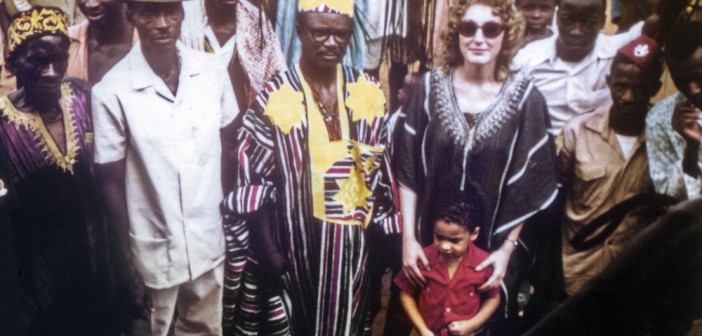“God has a plan, even if we go off the beaten path. We all have unique journeys that God helps us to fulfill.”
Anita Katherine Dennis
Everyone has a life story to tell and some are simply more unique than others. Anita Katherine Dennis has led an extraordinary life, which she chronicles in her book Beyond Myself: The Farm Girl and the African Chief. A farm girl who grew up in Ohio, the red-headed U of M-Flint student never dreamed she would fall in love with her college professor, Benjamin Dennis, who just so happened to be an African chief. The book was written as a memoir in honor of Ben, who passed away in 2009. “I wrote it to memorialize our love story,” says Anita. “I want my grandchildren to remember their African heritage.”
The couple spent much of their time together in Flint, and the book tells of the racial and cultural experiences of an inter-racial couple in the ‘70s through the ‘90s. Anita also shares the struggles she faced with her own family’s difficulty accepting her decision to marry Ben. In 1970, the couple moved to Flint, where they raised their three sons. “I can’t think of a better place to raise interracial children than in Flint Michigan,” Anita says. Lois and Edgar Holt were famous black community leaders who urged Ben to come to Flint. Anita remembers General Motors being on strike at that time and how some of the GM workers helped with renovations of the Dennis home on Wood Lane Drive. “Flint was very good for us,” says Anita. “We loved that the city was integrated and there was a black middle class.” Anita describes that time as “when Flint was at its best.”
Ben and Anita felt very comfortable and accepted in the academic community. “I never felt completely encased in white society,” says Anita, “but had access to black people.” Anita remembers at that time the University of Michigan-Flint was housed in temporary buildings until the permanent structure was built. Students didn’t live on campus and it had a different flavor. She continued her education at the university and graduated in 1973 with a Bachelors Degree in Sociology and a minor in Anthropology. Former Mayor Woodrow Stanley was also one of Ben’s students.
Anita’s journey took her beyond Flint to a remote village in Liberia, West Africa with Ben and their sons, where she played the role of an African chief’s wife. In the book, she shares her struggle to be accepted into the Mende tribe. In 1972, Anita made her first of many trips to her husband’s beloved country. They visited Ben’s father’s village of Vehun and his mother’s grave in the Gbandi village of Somalahun. This is also when Anita was accepted by the Mende Tribe. The Mende town chief said to her, “We don’t look at a person’s skin; we look at their heart.” It was when she returned to Michigan that the reality hit her. “I hadn’t visited Africa. I married it.” She lived in Ben’s village for a year, from 1983 to 1984 as a lay missionary.
Ben retired from the university in 1991 under troubling circumstances and the couple moved to Fort Myers, Florida in 1992. Their children are now grown: Joe lives in Chicago, Ben works for the Federal Reserve in Washington, D.C. and Peter is a criminal defense attorney in Fort Myers. Joe frequently returns to Flint to visit friends. “I wish Flint well,” says Anita, adding that her sons had many educational and cultural experiences in Flint. They attended Mott Camp and enjoyed participating in theatre groups and events of the St. Cecilia Society and visiting the Sloan Museum. Flint is where her son Joe gained a love for cars. “Flint will always be home to me because we raised our kids there,” says Anita. “I felt that I was part of the community and my kids really benefitted from what Flint offers.”








